
Coping Skills for Social Anxiety: Reveal The Real You
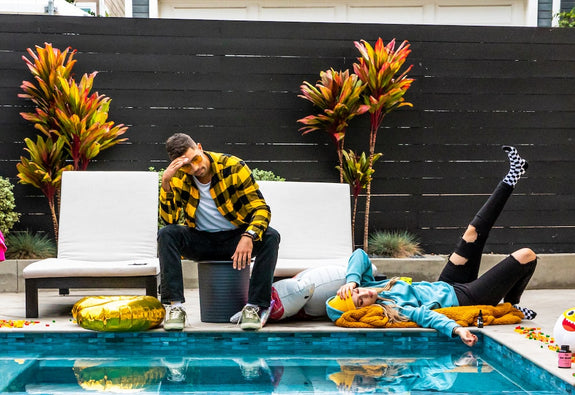
In today's fast-paced, super-connected world, social anxiety is a big deal. It affects people of all ages and backgrounds.
Do you feel scared to be in social situations, doubting yourself, and not being able to show your true colors?
It's like having a constant fear of being judged and it can make even simple interactions feel like a huge deal.
It's no joke, it can lead to missed opportunities and feeling all alone, and if those negative thoughts exacerbate it can turn into a social anxiety disorder. That's why it's important to address these concerns and help people feel confident and authentic in social situations.
Don't worry, I used to deal with social anxiety myself and I'm telling you first hand that there is light at the end of the tunnel and ways you can show up as your best possible self.
In this article, we will discuss these strategies in detail, including CBT techniques, body language, adding activities to conversation, keeping smartphones away, using CBD as a secret weapon, positive affirmations and deep breathing.
What Is Social Anxiety?: The Full Download
Social Anxiety is the party pooper at your soiree, the third wheel on your date, the uninvited guest who just won't leave.
Imagine your brain throwing a rave, and social anxiety is the grumpy neighbor who calls the cops because the music is too loud.
It's that nagging feeling that everyone is watching you, scrutinizing your every move, even when they're clearly engrossed in a topic that probably presents no judgement towards you.
In a nutshell, social anxiety is your overly protective, albeit misguided, inner voice that screams "Alert! Judgement Day!" every time you step into a social situation.
It's as unhelpful as a customer service agent at an insurance company, turning even the simplest hello into a frustrating, sweaty-palmed ordeal.
But don't sweat, we're in this together, and we're going to kick its uninvited butt right out of your life.
The Scientific Definition of Social Anxiety
From a scientific perspective, Social Anxiety Disorder (SAD), also known as Social Phobia, is a recognized psychological condition classified in the Diagnostic and Statistical Manual of Mental Disorders (DSM-5).
It is characterized by an intense and persistent fear of being watched or judged by others. This fear often leads to feelings of embarrassment, self-consciousness, and depression.
According to the American Psychiatric Association, people with SAD have significant anxiety, fear, or avoidance of social situations where they could potentially be scrutinized by others.
These situations often include public speaking, meeting new people, physical exercise with others, eating or drinking in public, or even just being observed while doing something.
SAD is not just "nervousness" before a presentation or "shyness" in social situations. It is a chronic, debilitating condition that can greatly interfere with a person's daily life.
Studies suggest that SAD is linked to abnormalities in the amygdala and hippocampus regions of the brain that govern fear response and memory respectively.
Moreover, there is also evidence that SAD may have a genetic component. Thanks Mom & Dad!
Remember, it's always important to seek help from a medical professional if you believe you may be dealing with severe Social Anxiety Disorder. It's not just a personality quirk, but a real, diagnosable, and treatable condition.
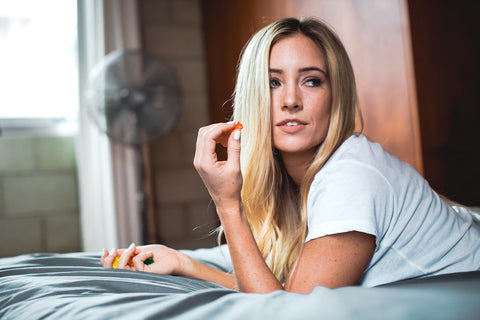
What is the Root Cause of Social Anxiety?
Ah, the million-dollar question. If only we could pin it down to a single, nefarious culprit – like an evil mastermind in a superhero movie.
In reality, that's a bit like blaming only the iceberg for the sinking of the Titanic. Sure, it played a big part, but there were plenty of other factors involved, like poor design, lack of lifeboats, and an overconfident crew.
So, let's dive into the murky waters of social anxiety causes.
First and foremost, there's genetics. Yes, those lovely genes your parents graciously passed down to you. Some people are genetically predisposed to be more anxious, and there's not much you can do about that apart from blaming your ancestors.
Then there's the environment. If you grew up in a household or society that valued extreme perfection or had high expectations, your social anxiety might be saying, "Thanks for the pressure, folks." High school, with its unspoken rules and brutal hierarchy, doesn't help either. It's like a boot camp for social anxiety.
Lastly, the structure and function of your brain can play a part. Remember the amygdala and hippocampus we mentioned earlier? If they're overactive or not communicating properly, it's like having an alarm system that goes off at the slightest hint of danger. "Red alert! They laughed at your joke... but was it at your joke, or at you?"
So, in a nutshell, the root cause of social anxiety isn't a root at all. It's more like an intricate web or a messy, tangled ball of yarn. And yes, while it's a whole lot harder to untangle a ball of yarn than to uproot a plant, it's not impossible. So don't lose hope.
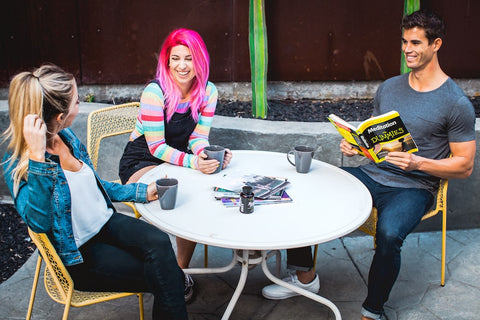
The Top 8 Coping Skills for Social Anxiety
Fortunately, there is an entire tool belt of social anxiety coping skills, from Cognitive Behavioral Therapy to breathing exercises. Here are the top eight strategies to overcome social anxiety:
1. Cognitive Behavioral Therapy (CBT)
This is a type of therapy that helps you understand and change thought patterns that lead to harmful actions or feelings of unease. It's particularly effective for social anxiety as it enables you to confront and reinterpret your fears.
While CBT should be performed after a clinical psychology review, Cognitive Reframing is a technique you can use now that involves changing how one thinks about a situation. By reframing negative and anxious thoughts into more positive, helpful, and realistic ones, individuals can improve their emotional experience and reduce their anxiety.
A Real Life Example of Cognitive Reframing:
Let's say you're at a networking event, and you see someone you'd love to chat with. But suddenly, your social anxiety pipes up, like an unwelcome commentator, "They're too important to talk to us. You'll stumble over your words and spill your drink. Everyone will laugh. We'll be the talk of the town, and not in a good way."
Here's where cognitive reframing comes in. Instead of bowing down to that doom-filled commentator, you challenge it, "Well, you're a bundle of sunshine, aren't you?" You then replace that negative narration with a more positive one. "Yes, they're important, but they put their pants on one leg at a time, just like I do. If I stumble over words, I'll laugh and make it a joke. If I spill my drink, I've got a great ice-breaker, 'I always wear my drink, it's the latest fashion trend!' Worst case scenario, I'll have a funny story to tell. Let's do this!"
By changing the narrative in your head, you turn a terrifying ordeal into an exciting adventure. That's Cognitive Reframing, turning lemons into a lemonade stand, and making a profit while you're at it.
2. Practicing Body Language
Social interactions are not just about words but also about body language. Practicing positive body language cues, such as keeping eye contact, smiling, and open gestures, can make one appear more approachable and relaxed.
Positive body language cues can also trigger positive feelings, which can help reduce anxiety, improve social interactions and challenge negative thoughts.
A Real Life Example of Practicing Body Language:
Imagine you're at a party and you see a group of people you’d like to join. Your social anxiety might suggest you cross your arms, avoid eye contact, and hope that someone will magically initiate a conversation. But instead, you choose to channel your inner superhero, an "anxiety-slayer", if you will.
You puff up your chest, like Superman readying for takeoff, and stride confidently towards the group. As you approach, you throw in a casual wave - not the frantic royal wave that looks like you're swatting a bee, but a chill, two-finger salute. You flash a wide grin - not the Joker-style, ear-to-ear one that could scare small children, but a friendly, inviting one.
Upon joining the group, you maintain good eye contact, like you're trying to telepathically communicate, "I'm listening, and I am interested in what you're saying." But remember, it’s not a stare down contest, you don't want to creep people out.
In this way, you've just positively influenced the interaction with your body language, making yourself appear more approachable and friendly. And all it took was channelling a bit of superhero swagger and a telepathic "I come in peace" message.
3. Adding Activities to Conversation
Adding activities to conversation can help you overcome social anxiety by providing a focus beyond one's discomfort. These activities can include watching a movie, listening to music, or playing games.
Additionally, activities can serve as a way to break the ice and build connections with others, particularly for those who find it difficult to engage in more traditional social activities or who get overwhelmed by social phobia.
A Real Life Example of Adding Activities to Conversation:
Imagine you're at a casual Friday night get-together with a mishmash of friends, acquaintances, and people you're meeting for the first time.
The conversation is flowing about as well as a dammed-up river and your social anxiety is having a field day, "We have nothing to say! We're doomed to be the social equivalent of a dial tone!"
Let's turn this ship around, shall we?
You remember an absurdly hilarious video you saw online recently about a cat who somehow managed to get itself wrapped up in a roll of toilet paper and looked like a feline mummy. It was a sight that would have left even the grumpiest individual chuckling.
And suddenly, an idea strikes you. You pull out your phone and say, "Guys, you've got to see this. I watched this the other day and almost sprayed my coffee out of my nose."
A hush descends, and eyes are now focused on you and the screen of your phone. As you play the video, laughter begins to erupt around the room, the ice is broken, and the conversation resumes - this time much more naturally and with a lot more laughs.
Crisis averted. Social anxiety: 0, You: 1.
The cat mummy video - an unorthodox hero of the social scene. You didn't just add an activity to the conversation, you catalyzed it, turning an awkward gathering into a comedic symposium, one cat video at a time.
4. Keeping Smartphones Away
While we just used a smartphone as a coping strategy, which is perfectly normal, it's important to remember they have their place and time.
Smartphones have revolutionized how we communicate, but they can also interfere with social interactions, particularly with intimate partners, family members, friends, and colleagues.
Individuals with SAD should make a conscious effort to put their smartphones away during social events. Studies show this strategy can help reduce anxiety, increase social engagement, and promote personal connection.
A Real Life Example of Keeping Smartphones Away:
Suppose you're at a friend's housewarming party. Your social anxiety is performing its usual shenanigans, prompting you to take up temporary residence in the corner of the room, your eyes glued to the comforting glow of your smartphone screen.
You're halfway through level 137 of Candy Crush, and you're convinced that breaking your high score is indeed a matter of life and death. But then, you remember the advice about keeping smartphones away to enhance social interactions.
Suddenly, you have an ingenious idea. You stand up, hold your phone high, and declare, "Ladies and gentlemen, I am about to perform the unthinkable. Brace yourselves."
With a dramatic flourish, you switch off your phone, as if you're disarming a bomb in an action-packed thriller. Simultaneously, you remember you're not in a movie but at a real-life social gathering, so you follow it up with a humorous, "And no, I'm not expecting a call from the president."
Cue laughter and a few friendly jeers. You've just made yourself the center of attention, but in a fun and approachable way.
Plus, you've demonstrated the courage to disconnect from the digital world and connect with the real one. And maybe what you say doesn't have to be this cheesy, but let your social skills take over for the best delivery.
Well done, you social butterfly, you. Social anxiety: 0, You: 1.
5. Exposure Therapy
Gradual exposure to social situations can desensitize you to anxiety triggers. Start small, with situations that only slightly trigger your anxiety, and slowly work your way up.
Exposure therapy helps by challenging the fearful beliefs and anticipatory anxiety about social situations, ultimately leading to a reduction in fear response and an increased ability to engage in social interactions.
Over time you'll start to subconsciously understand that there aren't a ton of negative consequences in putting yourself out there.
A Real Life Example of Exposure Therapy:
Picture this: you're at your favorite coffee shop, and your social anxiety disorder is busily concocting a series of catastrophic scenarios involving you, a hot latte, and a room full of strangers.
You've always hated ordering - the thought of having to articulate your complex coffee needs to a barista while everyone in line behind you sighs audibly is your idea of a nightmare.
But today, you've decided to stand up to your social anxiety. You're going to order your coffee... out loud. Sounds like a Quentin Tarantino movie plot, doesn't it?
You approach the counter, your heart pounding like a drum at a rock concert, and your palms are so sweaty you could probably water a small cactus.
You clear your throat - not the hacking, attention-grabbing kind, just a mild, polite throat-clearing.
The barista looks up, and you begin, "I would like a medium, no, a large... actually, let's go crazy, a venti, skinny, caramel latte, with an extra shot of caffeine, because it's that kind of a day... and a dash of cinnamon, please."
You did it. You ordered your coffee out loud, with a bit of humor and without turning into a human tomato.
A few people in line even chuckle at your quip about it being "that kind of a day."
Congratulations, you've just had your first taste of exposure therapy, and it wasn't as scary as you thought, was it? Plus you just gained a vote of confidence against your usual automative negative thoughts.
Your social anxiety: 0. You: 1. Latte: pending but promising.
6. CBD: The Secret Social Situation Weapon
Cannabidiol (CBD), a non-psychoactive compound found in the cannabis plant, is gaining recognition for its potential therapeutic effects, including its potential to alleviate stress caused by social interaction.
CBD is believed to interact with receptors in the brain that regulate intense fear and is extremely effective in helping you battle those endless negative thoughts.
A 2011 study published in Neuropsychopharmacology supports these findings. The study involved subjects with Social Anxiety Disorder (SAD) who underwent a simulation public speaking test (SPST).
Participants were divided into two groups; one received an oral dose of CBD while the other received a placebo.
The group that received CBD reported significantly reduced anxiety, cognitive impairment, and discomfort during their speech performance compared to the placebo group.
This study suggests that CBD could be a valuable tool in managing social anxiety symptoms.
A Real Life Example of Using CBD Gummies:
Imagine, you're at the annual neighborhood potluck dinner gathering. Your lasagna is getting rave reviews, but you're feeling more 'nervous noodle' than 'cool lasagna'.
The chit-chat is relentless and your social anxiety is singing a duet with your heart rate - an off-key rendition of 'Stairway to Hell'.
Suddenly, you remember the secret weapon you tucked into your pocket - a little bottle of CBD gummies.
With a casual air, you whip out the bottle, pluck out a gummy and pop it in your mouth.
Mrs. Peterson from next door, known for her 'curiosity', immediately pipes up, "Oh, what's that, dear?"
You swallow (the gummy, not your fear) and reply with a grin, "Just a little magic gummy, Mrs. P". Her eyes grow round as saucers as she exclaims, "Magic? Really?"
Without skipping a beat, you wink at her and say, "Well, not the Harry Potter kind, more like the 'helps me pretend I enjoy small talk' kind."
Laughter ripples through the room, and suddenly, the gathering doesn’t feel too intimidating. Thanks to your CBD gummy, you're not just surviving the potluck, you're actually enjoying it.
Social Anxiety: 0, You: 1, Mrs. Peterson's curiosity: Far too high.
7. Positive Affirmations
Reinforcing positive self-perceptions can improve self-esteem and reduce feelings of inadequacy. Regularly repeating affirmations such as "I am confident, and I can handle this", can help to challenge and subdue negative thoughts.
Over time, these positive affirmations can alter your thought patterns, making you more resilient to social stressors and enabling you to overcome social anxiety.
A Real Life Example of Using Positive Affirmations:
Envision this: You’re at a family reunion and it’s time for the most dreaded of all activities – karaoke.
Aunt Jean always insists, and she’s got the microphone aimed at you like a heat-seeking missile.
Your palms go clammy at the thought of belting out a tune in front of the entire family.
Suddenly, you remember your daily positive affirmations. With a mental pep-talk, you repeat in your mind: "I am the Beyoncé of this family reunion, and I can handle this."
You take the mic, clear your throat, and decide to go all-in, choosing Celine Dion's "My Heart Will Go On."
As you hit the high notes, your voice wavers, sounding more like a squeaky toy than a diva.
But you're unfazed, because after all, you're the Beyoncé of this family reunion.
The room erupts with laughter and applause, and you take a bow, feeling more like a rockstar than ever.
Positive affirmations: 1, Karaoke anxiety: 0, Titanic: Sunk again, but with flair.
8. Deep Breathing
There are many relaxation techniques, but this one is a simple, but powerful physiological method. Deep, slow breathing can help your body to relax and can calm your mind.
By initiating the body's natural relaxation response, deep breathing can reduce the physical symptoms of SAD, such as rapid heart rate and excessive sweating, making social situations more manageable and less stressful.
A Real Life Example of Using Deep Breathing:
Picture it. Your coworker's birthday party, and you've been roped into participating in the office tradition: The Dreaded Birthday Speech.
As the newbie, you're up first. The room feels hotter than a summer's day in Dubai and everyone's eyes are on you.
Your heart's beating a rumba in your chest, your shallow breathing takes over, and your hands are shaking as if you've been holding a jackhammer for hours.
Summoning your inner Zen master, you remember the deep breathing technique you read about.
You close your eyes, take a slow, deep breath in through your nose, imagining the air filling your lungs like a balloon. You hold it for a few seconds... then slowly exhale through your mouth, envisioning your stress being expelled out with it.
You repeat these deep breaths a couple of times, and strangely... it works.
Your heart slows its pace, trading the frantic rumba for a calm waltz.
With newfound courage, you stand, clear your throat, and start your speech with, "What can I say about John? Other than he has the unique skill of somehow always knowing when there are donuts in the break room..."
The room erupts with laughter, and you finish your speech to a round of applause.
Deep breathing: 1, Public speaking anxiety: 0, Office donuts: probably all eaten by John.
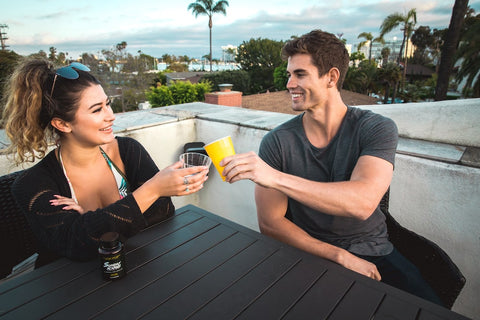
How do I stop Social Anxiety from ruining my freakin' life?
Well, I'm glad you asked. The first step in stopping social anxiety from ruining your life? Stop giving it free rent in your mind!
Now, I know what you're thinking - if only it were that easy, right? But hear me out.
Social anxiety might be like that uninvited party guest who keeps hovering around the snack table, but you, my friend, are the bouncer. It's time to give it the boot.
Start by putting yourself out there, one baby step at a time. Make a pact with yourself to do one mildly uncomfortable social thing each day.
Maybe it's simply ordering a coffee out loud, or perhaps it's saying 'hello' to a neighbor (yes, even the one who keeps forgetting to return your lawn mower). Remember, Rome wasn't built in a day, and neither is social confidence.
Now, let's talk about your inner self-talk. If it's anything like my grandmother's nagging, then we've got some work to do. Ditch the negative chatter and replace it with positive affirmations because, guess what? You're awesome and it's high time you realized it.
Last but not least, remember to breathe. Seriously, it's not optional.
Deep, slow breaths can be your greatest ally in a tense social situation. And if all else fails, just remember - most people are too wrapped up in their own nervous ramblings to notice yours.
So, buckle up, face your fears and remember, the spotlight is rarely on you as intensely as you think. Now go out there and socialize like nobody's watching so the ghost of your self conscious past can disappear.
When to Seek a Mental Health Professional?
If your social anxiety disorder persists despite trying various self-help relaxation techniques, and the negative thoughts become too overwhelming, it may be time to seek assistance from a qualified mental health professional.
Mental illness, including anxiety disorders and social phobia, is a serious condition that requires professional care.
The symptoms of social anxiety, such as intense fear in social situations, avoidance of social interactions, and physical symptoms like rapid heart rate, nausea, or excessive sweating can significantly impact your everyday life and overall well-being.
Mental health professionals can provide comprehensive assessments, provide a systematic review, and implement effective psychological and pharmacological interventions.
In some cases, medication may also be prescribed as part of the treatment plan.
Remember, reaching out to a mental health professional is not a sign of weakness; it's a proactive step towards addressing your medical condition and reclaiming your life from social anxiety.
Conclusion: Be Your True Self
In conclusion, we've discovered that anxiety inducing situations can lead you feeling anxious with negative physical reactions.
Whether it's turning you into a nervous wreck at potlucks, making you sweat bullets during office speeches, or convincing you that you're not the social butterfly you truly are, it's a party crasher that needs to be shown the door.
But here's the thing, my socially anxious comrades, you're not alone in this, and you've got more power than you think.
You've learned that CBD gummies can be your secret weapon, deep breathing can transform you into an office oratory ninja, and positive affirmations can turn Aunt Jean's karaoke challenge into your personal Grammy Awards.
Remember, social anxiety might have moved into your mind provoking self critical thoughts, but only you decide if it gets to stay rent-free.
Take it from someone who's been there; you're capable of kicking social anxiety to the curb with a pair of fabulous, confidence-filled boots.
Next time you feel anxious, use these coping strategies to address that annoying, yet severe, anxiety so you can stay in the present moment and be the best damn version of yourself.
My friends, it's time to stand tall, take a deep breath, remind yourself you're more Beyoncé than wallflower, and embrace the glorious mess of human interaction that life is.
Overcoming social anxiety is easier than you think it is. You've got this.
Social anxiety: Prepare to be evicted.
Ready to fight the Sunday Scaries? Shop our CBD Gummies for Focus, CBD Candy, CBD Treats for Dogs, CBD Gummies, CBD Oil Tinctures, CBD Sleep Oil, Extra Strength CBD Gummies, Delta-9 THC Gummies, CBD Edibles, and Vegan CBD Gummies online today!

 CBD Gummies
Stress Relief
CBD Gummies
Stress Relief
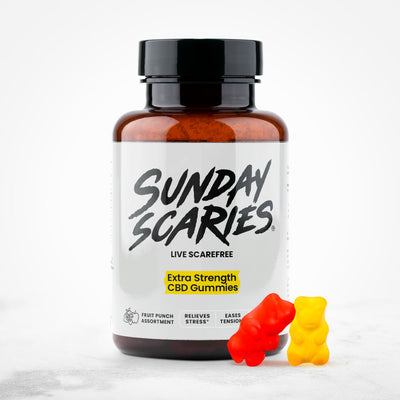 Extra Strength CBD Gummies
Stress Relief
Extra Strength CBD Gummies
Stress Relief
 Vegan CBD Gummies
Stress Relief
Vegan CBD Gummies
Stress Relief
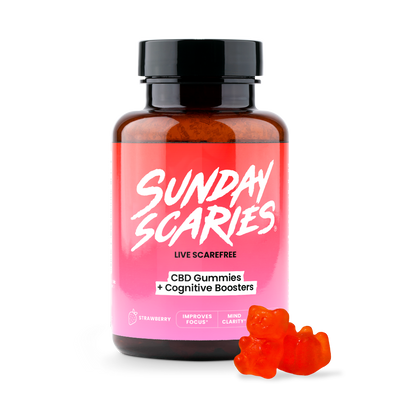 CBD Gummies for Focus
Focus Boost
CBD Gummies for Focus
Focus Boost
 CBD Candy
Mood Lift
CBD Candy
Mood Lift
 CBD Daytime Oil
Stress Relief
CBD Daytime Oil
Stress Relief
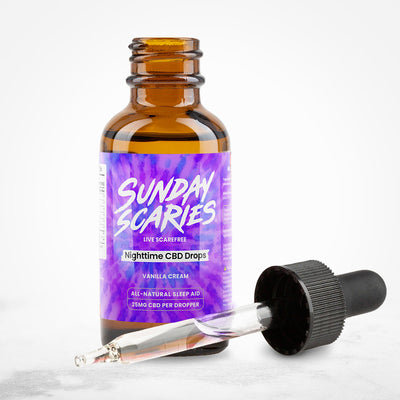 CBD Sleep Oil
Sleep Aid
CBD Sleep Oil
Sleep Aid
 CBD Dog Treats
Stress Relief
CBD Dog Treats
Stress Relief
 Side Piece Bundle
Stress Relief
Side Piece Bundle
Stress Relief
 Rando Bundle
Stress Relief
Rando Bundle
Stress Relief
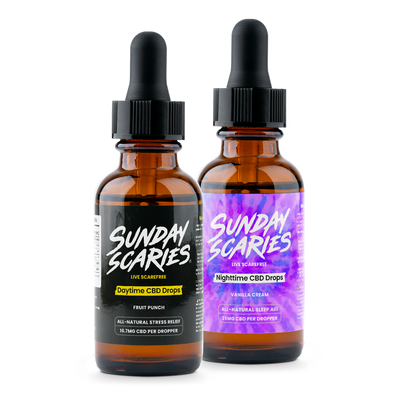 Sunrise & Sunset CBD Oil Bundle
Stress Relief
Sunrise & Sunset CBD Oil Bundle
Stress Relief
 5mg Delta-9 Gummies
Euphoria
5mg Delta-9 Gummies
Euphoria
 10mg Delta-9 Gummies
Euphoria
10mg Delta-9 Gummies
Euphoria
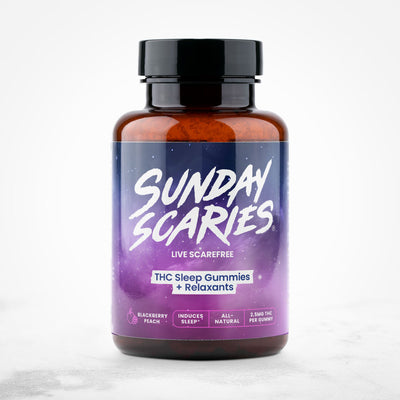 THC Gummies for Sleep
Sleep Aid
THC Gummies for Sleep
Sleep Aid
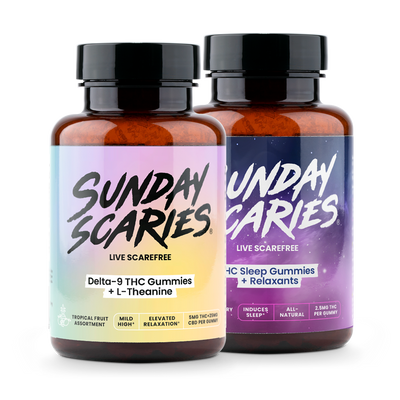 Day & Night THC Gummies Bundle
Stress Relief
Day & Night THC Gummies Bundle
Stress Relief
 Mushroom Gummies
Focus Boost
Mushroom Gummies
Focus Boost
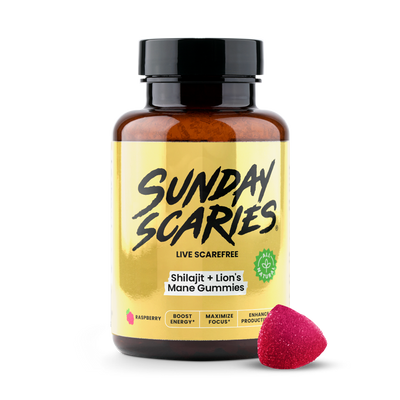 Shilajit Gummies
Focus Boost
Shilajit Gummies
Focus Boost
 Sunday Scaries Hat
Sunday Scaries Hat
 Sunday Scaries Dad Hat
Sunday Scaries Dad Hat
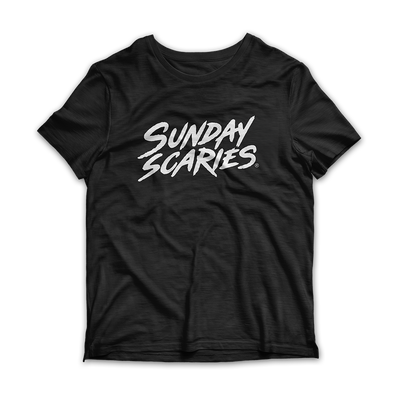 Sunday Scaries T-Shirt
Sunday Scaries T-Shirt
 Sunday Scaries Pocket Tee
Sunday Scaries Pocket Tee
 Sunday Scaries Tank Top
Sunday Scaries Tank Top
 Sunday Scaries Sweatshirt
Sunday Scaries Sweatshirt
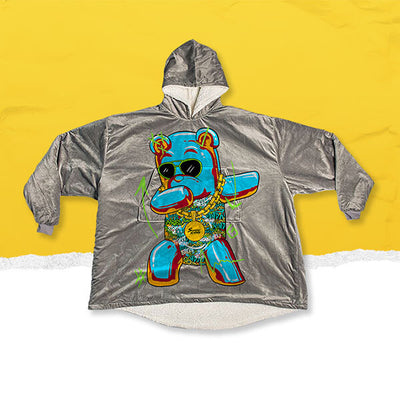 Sunday Scaries Blanket Jacket
Sunday Scaries Blanket Jacket
 Sunday Scaries Sweatpants
Sunday Scaries Sweatpants

